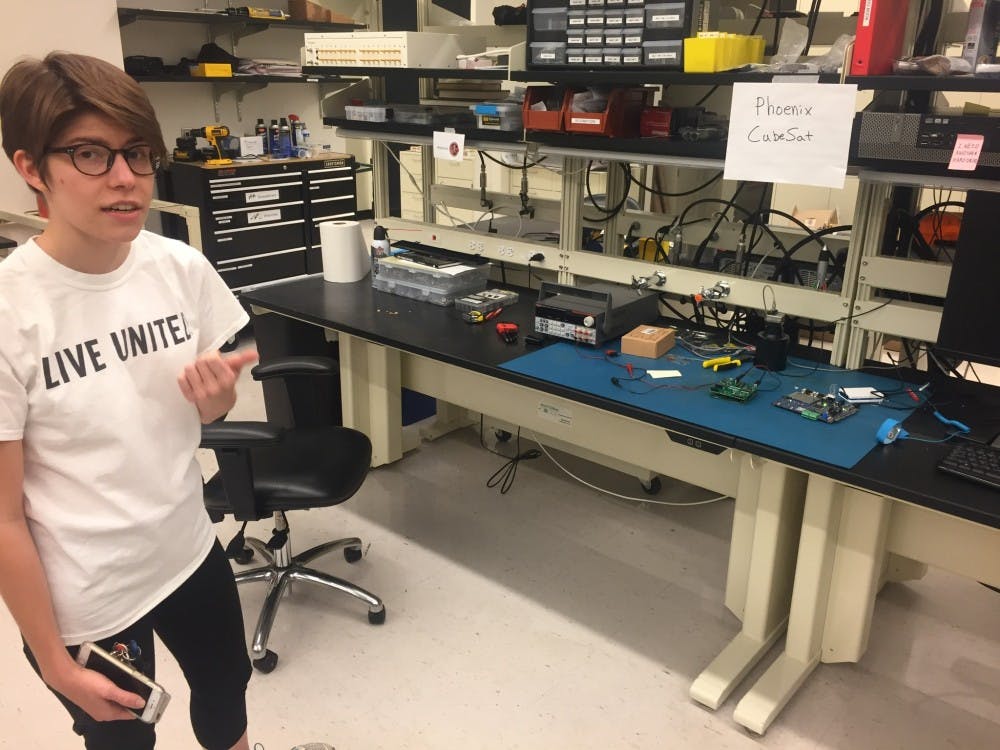ASU’s Project Phoenix is preparing to run its first experiments after finishing its preliminary design review for launching a small satellite into space.
The project, part of the Sun Devil Satellite Laboratory and composed solely of undergraduates, aims to design a CubeSat, a satellite about the size of a loaf of bread and send it into space, according to key members of the team.
Jaime Sanchez De La Vega, a junior studying aerospace engineering and president of the Sun Devil Satellite Laboratory, leads the Phoenix mission as its chief engineer.
“It’s going to be carrying a thermal infrared camera that’s going to take pictures of cities across the United States,” De La Vega said. “Most importantly, it’s going to take measurements of the urban-heat islands across the cities.”
He said the camera will measure how cities’ designs and structures affect their temperature.
“With this information, we can potentially better structure the cities to make them more comfortable and more efficient in the future,” De La Vega said.
Until recently, most of the team’s work has been computer simulations and design, De la Vega said.
“Now we’re actually going to build something,” De La Vega said.
He said the CubeSat mission is funded through a NASA grant and launch is inevitable.
“We’re guaranteed to launch into space now, we just need to know specifically when,” De La Vega said.
De La Vega said their educational initiative was just as important as their scientific process.
“We are training the scientists and engineers of the future,” De La Vega said.
As an undergraduate-led mission, Project Phoenix receives help from college faculty, but not guidance, De La Vega said. He said this helps the team learn all aspects of creating a satellite.
Sarah Rogers, a sophomore studying aerospace engineering and project manager of Project Phoenix, also leads the mission. She said the team includes more than scientists and engineers.
“You don’t have to be a rocket scientist to do cool stuff at the undergraduate level,” Rogers said.
Rogers said she helps manage students at the ASU Herberger Institute for Design and the Arts who are making a documentary about the Phoenix program. She also manages PR specialists from the Walter Cronkite School of Journalism and Mass Communication.
As the project manager and a systems engineer, Rogers is involved in most aspects of the satellite, from design to experimentation to data, she said.
“It’s taught me how to approach problems and how to work toward solving them,” Rogers said. “And if I don’t quite understand how to solve them, I go about trying to understand how to solve them.”
She said the satellite will take measurements of 18 cities, seven of which are confirmed.
“Those core seven, as we like to call them, are Phoenix, Chicago, Los Angeles, Minneapolis, Houston, Atlanta and Baltimore.”
Project Phoenix chose these cities due to their high amount of human activity and number of clear, sunny days, which Rogers said helps their infrared camera gather data.
One of the first tests the project will run will be recording heat flux using the same model camera that will be on the satellite, Rogers said.
Haytham Mouti, a freshman studying aerospace engineering and a system engineer for Project Phoenix, said he appreciates the experience the mission has given him.
“Having the chance to work on something that’s actually going to space is incredible,” Mouti said.
He said working on a NASA-funded project should help his employment opportunities after college.
“It’s something I’ve dreamed of as a little kid, and now I get to fulfill (the dream) as a college student,” Mouti said.
Reach the reporter at chawk3@asu.edu.
Like State Press on Facebook and follow @statepress on Twitter.




